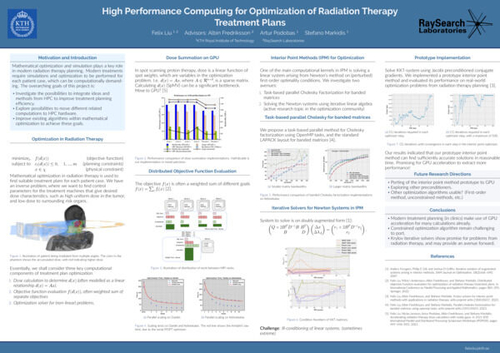Presentation
High Performance Computing for Optimization of Radiation Therapy Treatment Plans
DescriptionModern radiation therapy relies heavily on computational methods to design optimal treatment plans (control parameters for the treatment machine) for individual patients. These parameters are determined by constructing and solving a mathematical optimization problem. Ultimately, the goal is to create treatment plans for each patient such that a high dose is delivered to the tumor, while sparing surrounding healthy tissue as much as possible. Solving the optimization problem can be computationally expensive, as it requires both a method to compute the delivered dose in the patient and an algorithm to solve a (in general) constrained and nonlinear optimization problem.
The goal of this thesis project has been to investigate the use of HPC hardware and methods to accelerate the computational workflow in radiation therapy treatment planning. First, we propose two methods to bring the optimization to HPC hardware using GPU acceleration and distributed computing for dose summation and objective function calculation respectively. We show that our methods achieve competitive performance compared to state-of-the-art libraries and scale well, up to the Amdahl’s law limit.
Then, we investigate methods to accelerate interior point methods, a popular algorithm for constrained optimization. We investigate the use of iterative Krylov subspace linear solvers to solve Newton systems from interior point methods and show that we can compute solutions in reasonable time for our problems, in spite of extreme ill-conditioning. This approach presents one avenue by which constrained optimization solvers for radiation therapy could be ported to GPU accelerators.
The goal of this thesis project has been to investigate the use of HPC hardware and methods to accelerate the computational workflow in radiation therapy treatment planning. First, we propose two methods to bring the optimization to HPC hardware using GPU acceleration and distributed computing for dose summation and objective function calculation respectively. We show that our methods achieve competitive performance compared to state-of-the-art libraries and scale well, up to the Amdahl’s law limit.
Then, we investigate methods to accelerate interior point methods, a popular algorithm for constrained optimization. We investigate the use of iterative Krylov subspace linear solvers to solve Newton systems from interior point methods and show that we can compute solutions in reasonable time for our problems, in spite of extreme ill-conditioning. This approach presents one avenue by which constrained optimization solvers for radiation therapy could be ported to GPU accelerators.


